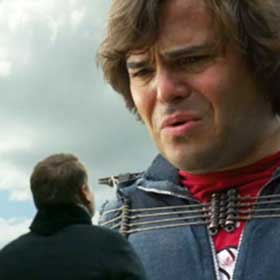Gulliver's Travels

2.5/5
After nearly three centuries of bitter negotiations, heated litigations and the birth of the film industry, Anglo-Irish cleric-turned-Hollywood heavy hitter Jonathan–Johnny to his friends–Swift's fantasy/sci-fi bestseller Gulliver's Travels was finally optioned off and turned into a comedy vehicle for Jack Black. Of course, in the interest of making the story a bit more accessible to modern audiences, screenwriters Joe Stillman (Shrek) and Nicholas Stoller (Get Him to the Greek) have added their own first act and cut out about 75 percent of Swift's original treatment, so that the film focuses entirely on Lemuel Gulliver's adventures in Lilliput, where he encounters a race of tiny folk who at first imprison him but eventually become his friends. In this sense, Gulliver's Travels is less a film adaptation of a classic novel than a film based on one or two vague scenes and images associated with Gulliver floating around in the popular imagination.
The film's opening minutes are devoted to a meticulous deconstruction of Lemuel Gulliver's psyche. While superficially they may only convey that Lemuel is the type of fellow who provides color commentary for the imagined early morning cavorting of his Star Wars action figures, air-drums in the shower, has a crush on Darcy (Amanda Peet), a top executive at the "news company" for which he works as a mail room attendant–though, perhaps taking a cue from Franz Kafka, the screenwriters never real the precise nature of the publication; okay, it might have been incompetence but what do you people want?: this is just the tacked-on first act to make the story of Gulliver's Voyage to Lilliput more "interesting" to people, it doesn't matter if it confuses them in the process!–perhaps more importantly these scenes illustrate this particular Lemuel Gulliver is not a "character" in any conventional literary sense–an agent in a narrative with specific qualities who engages with other agents with specific qualities–a but is in fact a rough composite of various dorky man-child characters Jack Black has played throughout his career. Surely the part was written with Black in mind as it affords him plenty of elbow room to carry out his in many cases digressive ad-libs.
The story takes a turn for the maudlin when Lemuel's protege of 24 hours, Dan, is promoted to head of the mailroom and, for no apparent reason, begins to behave cruelly towards Lemuel–who had up until that point been anything but unfriendly to him–suggesting that he give up any hope for happiness and success in life. Of course the reason for Dan's cruelty becomes apparent, albeit only in an extra-narrative sense: owing to the sad (well, less un-sad) expression on Jack Black's face and the plaintive strings and skeletal piano melody scoring the scene, the viewer concludes that the until now friendly and encouraging Dan has turned into a "mean man" who says "mean things" so that Lemuel will have to undergo some kind of mad adventure and prove him wrong!
Perhaps we'll never know what brought about this change in Dan, but it doesn't particularly matter: we have our first act. After Gulliver accidentally becomes a travel writer in the employ of his beloved Darcy, he must brave the Bermuda Triangle in order to dispel its reputation as a hotbed of supernatural activity, thus setting up his accidental journey to Lilliput in the most clumsy, circuitous and derivative manner imaginable. To be fair, Amanda Peet and Jason Segel really do make the most of their respective characters, the former pulling off some decent naturalistic acting, the latter, a respectable nonspecific British accent; and Black is consistently entertaining–that is, when he's given free reign to rock out with his guitar, slap his stomach and generally wig out; when forced to actually interact with his surroundings, he falters, as if crushed under the weight of their–most of the other actors, his own character, the entire tacked-on first act–comparative mediocrity. Though the film's special effects are by 2010 standards a bit hammy and cheap looking, its take on the Land of Lilliput is a lush and vividly imagined one.
Just as it would be unfair to judge the classic Looney Tunes cartoon A Witch's Tangled Hare as a faithful rendering of a Shakespeare play, it would be unfair to judge the second and third acts of Gulliver's Travels as an attempt to do justice to their source material, of which they are largely a parody. Those who believe that, in parodying Swift, Stoller and Stillman have failed to recognize that Gulliver's Travels was itself a parody of travelers' tales of antiquity, like True History by Lucian of Samosata, should bear in mind that Lucian of Samosata was, in turn, satirizing Homer. However, there is far more evidence to suggest that they have indeed missed the point, as Black's Gulliver is situated as the one sane put-upon giant trying to "keep up" with Swift's insane, unremitting plot convolutions. Though the film is not without its occasional laughs–such as Gulliver enacting as play for the warmed-over Lilliputians of his life story as a combination of Star Wars and Titanic–Jack Black's scaled up ass crack and torrential streams of urine are almost too horrifying to bear.
RELATED ARTICLES
Get the most-revealing celebrity conversations with the uInterview podcast!





Leave a comment